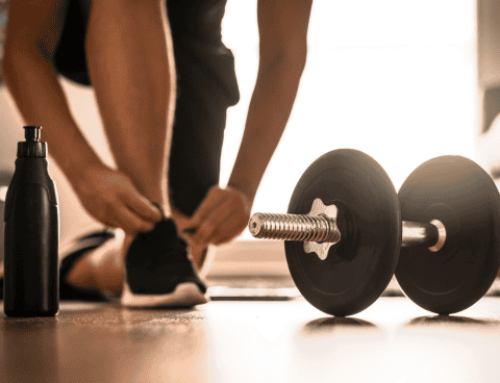Christian McCaffrey’s recovers like he plays—hard.
The Carolina Panthers’ do-it-all back played 91.3% of his team’s offensive snaps last season, totaling the third-most touches in the league. His 924 snaps were far and away the most among NFL running backs. He took full advantage of those opportunities, totaling 1,965 yards and 13 touchdowns from scrimmage en route to second-team All-Pro honors.
Despite the Herculean workload, McCaffrey claims he “felt great” the whole season. A lot of that has to do with his unique training regimen, which we’ve covered previously, but his obsessive recovery plays a key role. During our recent interview with the former Stanford star, he outlined his offseason recovery routine:
“The season is pretty rigorous on the body, and it can take a little bit of a toll on you. I’ll say fortunately, I felt great the whole season, felt pretty good after the season. But I’ll take about two-and-a-half to three weeks (after the season) where I do nothing but every single day is something based on recovery. I’ll cleanse my whole body. I’ll get back into my diet based on my weight goals. If I’m feeling heavy, I’ll adjust, if I’m feeling light, I’ll adjust. But it’s all recovery. So I’ll have hands-on every day. I’ll have chiropractors, soft tissue specialists, masseuse, all that stuff, work on me pretty much six or seven days a week. I’ll do IV fluids, I’ll do all my blood testing to make sure I’m good to go, (see) if they see anything from the season. I’ll do all my imaging, making sure my body is intact. That’ll be the first two and a half to three weeks.”
In a recent interview with Panthers Wire, McCaffrey expanded on his recovery methods a little further. “I do just about everything you can think of. Contrast bath. Sauna. Infrared sauna. Hyperbaric chamber. Cryotherapy, all that stuff. I don’t have (a cryogenic chamber) myself, unfortunately my contract isn’t as big as LeBron’s, but I definitely use all those tools,” McCaffrey says.
LeBron James reportedly spends $1.5 million a year to keep his body health, and while McCaffrey might not quite be at that level, it’s clear he invests a serious amount of time and money into recovery.
The blood testing McCaffrey refers to helps him fine-tune his diet, as it can reveal any allergies or sensitivities that may exist. Food allergies can begin at any age and appear seemingly without reason, so by having his blood tested regularly, McCaffrey ensures his diet and his body are always on the same page. He tweaks his macros each day based on the type of activity he’s performing, and Ascent’s line of supplements play a key role in pre- and post-workout nutrition.
After his postseason rest period, McCaffrey enters an intense training cycle (he performs all of his speed and strength workouts with a track coach, as we covered here). That period runs right up to Organized Team Activities, which began April 15 and will end on June 13. Once OTAs are over, McCaffrey takes another week to rest.
“When I say rest, I mean treatment, pool workouts, sauna, stretch, chiropractors—all that stuff is kind of my rest time. Then about a week after (OTAs), I hit it hard,” McCaffrey says. McCaffrey’s always been serious about his recovery, as it was said he’d spend “three to four” hours before and after games working on his body at Stanford, but he’s come to appreciate the fact that recovery is also very much about what you don’t do.
“A lot of time I have a bad habit of overtraining and wanting to do more. In my position, I’ve kind of had to sacrifice doing the easy thing—which might be hard to most people—but working really hard all the time and always training and not resting,” McCaffrey says. “I’ve learned when I really condition myself hard, I feel myself kinda getting slower. And I’ll probably rub a lot of trainers wrong saying that, but I started (training like this) last year, and I can honestly say there were very few times I felt tired during a game.”
Photo Credit: Panthers.com/Brandon Todd
READ MORE:
RECOMMENDED FOR YOU
Christian McCaffrey’s recovers like he plays—hard.
The Carolina Panthers’ do-it-all back played 91.3% of his team’s offensive snaps last season, totaling the third-most touches in the league. His 924 snaps were far and away the most among NFL running backs. He took full advantage of those opportunities, totaling 1,965 yards and 13 touchdowns from scrimmage en route to second-team All-Pro honors.
Despite the Herculean workload, McCaffrey claims he “felt great” the whole season. A lot of that has to do with his unique training regimen, which we’ve covered previously, but his obsessive recovery plays a key role. During our recent interview with the former Stanford star, he outlined his offseason recovery routine:
“The season is pretty rigorous on the body, and it can take a little bit of a toll on you. I’ll say fortunately, I felt great the whole season, felt pretty good after the season. But I’ll take about two-and-a-half to three weeks (after the season) where I do nothing but every single day is something based on recovery. I’ll cleanse my whole body. I’ll get back into my diet based on my weight goals. If I’m feeling heavy, I’ll adjust, if I’m feeling light, I’ll adjust. But it’s all recovery. So I’ll have hands-on every day. I’ll have chiropractors, soft tissue specialists, masseuse, all that stuff, work on me pretty much six or seven days a week. I’ll do IV fluids, I’ll do all my blood testing to make sure I’m good to go, (see) if they see anything from the season. I’ll do all my imaging, making sure my body is intact. That’ll be the first two and a half to three weeks.”
In a recent interview with Panthers Wire, McCaffrey expanded on his recovery methods a little further. “I do just about everything you can think of. Contrast bath. Sauna. Infrared sauna. Hyperbaric chamber. Cryotherapy, all that stuff. I don’t have (a cryogenic chamber) myself, unfortunately my contract isn’t as big as LeBron’s, but I definitely use all those tools,” McCaffrey says.
LeBron James reportedly spends $1.5 million a year to keep his body health, and while McCaffrey might not quite be at that level, it’s clear he invests a serious amount of time and money into recovery.
The blood testing McCaffrey refers to helps him fine-tune his diet, as it can reveal any allergies or sensitivities that may exist. Food allergies can begin at any age and appear seemingly without reason, so by having his blood tested regularly, McCaffrey ensures his diet and his body are always on the same page. He tweaks his macros each day based on the type of activity he’s performing, and Ascent’s line of supplements play a key role in pre- and post-workout nutrition.
After his postseason rest period, McCaffrey enters an intense training cycle (he performs all of his speed and strength workouts with a track coach, as we covered here). That period runs right up to Organized Team Activities, which began April 15 and will end on June 13. Once OTAs are over, McCaffrey takes another week to rest.
“When I say rest, I mean treatment, pool workouts, sauna, stretch, chiropractors—all that stuff is kind of my rest time. Then about a week after (OTAs), I hit it hard,” McCaffrey says. McCaffrey’s always been serious about his recovery, as it was said he’d spend “three to four” hours before and after games working on his body at Stanford, but he’s come to appreciate the fact that recovery is also very much about what you don’t do.
“A lot of time I have a bad habit of overtraining and wanting to do more. In my position, I’ve kind of had to sacrifice doing the easy thing—which might be hard to most people—but working really hard all the time and always training and not resting,” McCaffrey says. “I’ve learned when I really condition myself hard, I feel myself kinda getting slower. And I’ll probably rub a lot of trainers wrong saying that, but I started (training like this) last year, and I can honestly say there were very few times I felt tired during a game.”
Photo Credit: Panthers.com/Brandon Todd
READ MORE:










